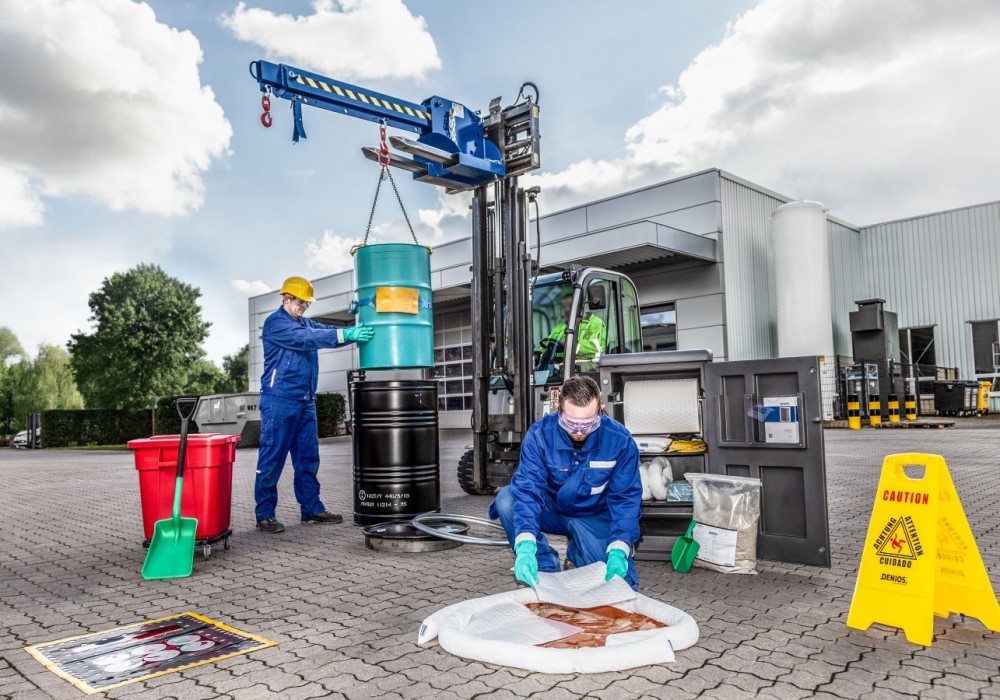
A recent incident at the end of May in Russia showed just how dramatic a leak of water-polluting substances can be: more than 20,000 tons of diesel fuel leaked from a power plant storage tank. The pollutants leaked into the ground and into nearby rivers, from where they spread further. The incident is considered one of the biggest oil disasters in the Arctic for years. The environmental pollution that occurred there on a large scale also happens on a smaller scale in German companies on an almost daily basis. The accident statistics for water-polluting substances published by the Federal Statistical Office speak for themselves: uncontrolled leaks and dangerous or environmentally damaging incidents occur every year. The latest available figures for 2018 show a total of 2448 registered accidents in which water-polluting substances were released into the environment in an uncontrolled manner.
This can be expensive for those responsible: there is a risk of business interruption and liability for property damage, personal injury and environmental damage. In addition to the considerable loss of image, this can lead to long-term civil or criminal proceedings. This makes it all the more important that, if the worst comes to the worst, every action is taken to prevent injury to employees and damage to the environment.
Measures for dealing with hazardous substance leaks
 The use of suitable binding agents is particularly important in the event of leaks. They are used to contain the spread of the leaked substances and ultimately enable proper disposal of the spill products. In this way, both the risks to employees and the impact on the environment and the company's own facilities are avoided.
The use of suitable binding agents is particularly important in the event of leaks. They are used to contain the spread of the leaked substances and ultimately enable proper disposal of the spill products. In this way, both the risks to employees and the impact on the environment and the company's own facilities are avoided.
Of course, when selecting binding agents, it is important to choose the right product with the best possible quality for the respective application. DENIOS, the global market leader in industrial safety and environmental protection, offers a large and convincing selection with its DENSORB® brand. The range of highly absorbent binding agents has been successfully established on the market for 20 years and is constantly being expanded with new products. It includes binding agents in a wide variety of forms such as mats, rolls, pillows and snakes. They can be used to safely absorb a wide variety of hazardous substances such as oils, emulsions, acids or alkalis. Typical areas of application are the manufacturing industry, but the fire department and disaster control also rely on the quality of DENIOS. DENSORB® nonwovens, for example, have a very high absorption capacity, e.g. for oil up to 16 times their own weight. They are particularly absorbent and are drip-proof and tear-resistant even when saturated. Sophisticated DENIOS know-how is behind this: Advanced Capillary Technology creates a very good capillary effect - thanks to a fine-pored membrane structure - and thus ensures particularly high absorbency.
To make it easier for customers to choose from the 388 different DENSORB® products, DENIOS is now offering a practical product finder and a guide to oil absorbents on its website.
Emergency spill management with DENIOS
Professional spill emergency management is essential for containing accidents. In addition to stocking the appropriate binding agents, this also includes comprehensive training for employees on how to secure the various hazardous substances in the event of a spill in accordance with the law and how to use binding agents. The measures to be taken are derived from the respective risk assessments, among other things. In this context, it is important that these are kept up to date and are complete. The definition of a reporting chain involving internal departments, the fire department and specialized disposal companies is also part of professional leakage emergency management.
With the leakage emergency training at the DENIOS Academy, companies can prepare their employees professionally for emergencies. In addition to the planning of suitable emergency measures, the different areas of application of binding agents are also discussed. The seminar has already been held over 500 times and takes place regularly at DENIOS in Bad Oeynhausen or, on request, directly at the customer's premises.
DENIOS has recently started offering free videos with tips and tricks for dealing with leaks of hazardous substances and for the correct use of binding agents. The content is clearly presented by biologist Tobias Authmann, the DENIOS expert with many years of experience in the storage of hazardous substances and occupational safety.
Further information on the DENSORB® range is available on the DENIOS website at www.denios.de/densorb. It is also possible to request free binder test packages there.




